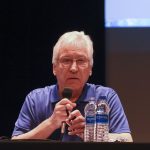MORGANTOWN — Morgantown Deputy Mayor Mark Brazaitis called the city a “servant” of WVU and described development of the $45 million Mountaineer Center at Mylan Park a “tragedy” for the city.
His comments came during Saturday’s town hall meeting at the Metropolitan Theatre. About 40 residents spent three hours questioning the council on topics ranging from annexation and public safety funding to relationships between the city and local stakeholders and the increasingly pointed rhetoric surrounding them.
Responding to City Manager Paul Brake’s claim that WVU has been “a good partner” to the city, Brazaitis, an English professor at the university, disagreed.
“We don’t have a relationship as a city with WVU. We have a relationship that’s more akin to owner/servant with WVU,” Brazaitis said, noting how the university’s $1.1 billion budget for 2019 dwarfs the city’s $38 million.
Brazaitis said he loves his students and colleagues, but “We need to re-examine the relationship between the city and West Virginia University in a big way because unconsciously, I think, and I hope it isn’t deliberate, they are gutting our town.”
WVU owns about one-third of the city’s footprint, essentially taking that property off the tax rolls.
Brazaitis has gone after the privately-owned Mylan Park in recent weeks, explaining that the Mountaineer Center track and aquatic facility being built there should have been placed within the city.
Brazaitis said he has asked WVU to write a check for $40 million to make much-needed improvements to city parks.
He encouraged local residents to be wary of the “illusion” of Mylan Park’s non-profit status without checking into how much its executives are paid.
During the most recent city council meeting Brazaitis read from a letter penned to the WVU Board of Governors regarding longtime BOPARC board member and current Mylan Park Board President Ron Justice:
“Why was a WVU employee, who was serving as a BOPARC board member, working to help a BOPARC competitor from the private sector?
Brazaitis elaborated Saturday.
“Who else had a hand in planning what’s happening at Mylan Park? A WVU lobbyist. That’s the kindest way I can put it. Someone who was paid by WVU to be part of those discussions and who did mislead me personally,” Brazaitis said.
Justice is a state and local relations specialist for WVU and a former Morgantown mayor.
Morgantown High track and cross-country coach Steve Blinco took exception to Brazaitis’ remarks about the construction of a long-needed track facility, explaining, “I’m sick and tired, Mr. Brazaitis, of you coming at our track facility.”
“Since 2011, when I took over at Morgantown High coaching both sports, we’ve won two state titles without a home facility … We’ve never hosted a home meet in the time I’ve coached at Morgantown and it’s sickening,” Blinco said. “Now we’re finally getting something built. Something that’s going to be there for generations and generations of kids. So my question to you is would you rather not have a track for the children of Morgantown and Mon County?”
But Blinco’s sentiments weren’t shared by everyone. Tony Christini said councilors should question other stakeholders when warranted.
“Some of the biggest critics of the Haymaker Forest purchase and city council are the very same voices saying don’t criticize the county commission, don’t criticize WVU, don’t criticize Mylan Park — even when those entities are, at times, working against the interests of Morgantown,” Christini said. “Of course we should criticize WVU, Mylan Park and the county commission when they’re working against the interest of the city. That should go without saying.”
While other council members noted they have issues with some aspects of the city’s relationship with WVU, they stopped short of endorsing the views of Brazaitis.
“I think we really need to double down on opening up channels of communication, not only with the university but the county commission,” Councilor Ron Dulaney said. “I don’t think we need to see the county commission, the county or residents of the county in an adversarial way.
“I think we need to build bridges and consensus. I think we’ll be far more effective doing that rather than engaging in antagonistic politics.”







